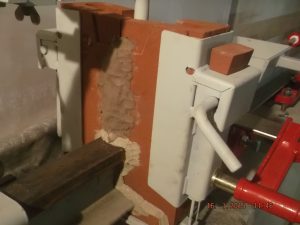
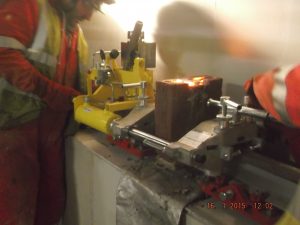
For those interested in materials and process technology – see images of the welding process for the towing tank rail installation process currently on-going in the new laboratory 5 of building 185. Contractors RapidRail have developed a process that should minimise heat distortion and allows us to achieve an eventual rail alignment tolerance of 0.1mm.

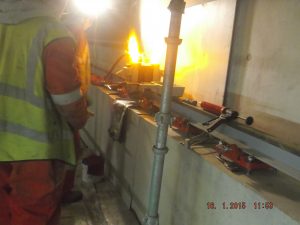
Monthly Archives: January 2015
Concept Design Study awards presented to Ship Science 3rd year students
Ten experienced naval architects from the Royal Institution of Naval Architects (RINA), BMT Defence Services, BMT Nigel Gee, Lloyd’s Register and the University of Southampton gathered on the 11th December to assess the concept designs in a ‘desktop review’.
Groups of third year Ship Science students took part in the Concept Design module from October until mid-December (Click here for more information) Over the semester the teams produced eight different concept designs. This year, the selected craft types were: two offshore crew boats, two customs cutters, two small fast ferries and two luxury yachts.
The RINA-BMT Design Prize was awarded to Antoine Du Baret De Lime, Ricardo Camin, Daniel Bruce and Chrysi Xanthi Lymperopoulos for their customs cutter concept design.
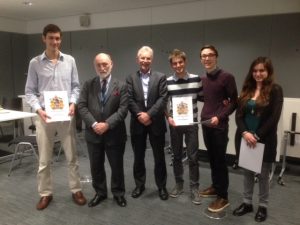
The Ship Science Concept Design Prize was awarded to Abigail Muscat, Max Nicholson, Jeremy Thong and Gilberto Besana.
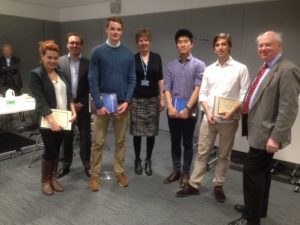
Continue reading Concept Design Study awards presented to Ship Science 3rd year students
Slamming Catamarans and Surfing Prawns 15th Jan 175/1025 12noon
Professor Giles Thomas, BMT Chair of Maritime Engineering at University College London will present on “Slamming Catamarans and Surfing Prawns” in the beginning of new year.
Date: Thursday, 15/1/2015 Room: Boldrewood campus B175 Seminar Room 1025 Time: 12:00-13:00
High-speed catamarans have been the cornerstone of the Australian ship design and building industry over recent decades. Though there have been several major research challenges to ensure they have maintained their global edge. One of these challenges has been the ability to design vessels to operate in extreme wave conditions, at high speed whilst maximising payload – this has needed significant insight into the wave loads experienced by such craft and in particular slamming characteristics. This talk will outline the approach taken by a team in Tasmania to solve these issues and some key findings.
Also to bring some sunshine to the wintry UK, two other Australian summertime-focused projects will be introduced: surfing wave pools and fish bycatch reduction.
Biography
Giles Thomas was recently appointed to the BMT Chair of Maritime Engineering at University College London. Previously he was Professor and Director of the National Centre for Maritime Engineering and Hydrodynamics at the Australian Maritime College, an institute of the University of Tasmania – responsible for the maritime engineering academic programmes, research activities and suite of research facilities. He has over 24 years of research and development experience in the fields of hydrodynamics and fluid-structure interaction working with a large range of industry partners including the Defence Science and Technology Organisation, Incat, Woodside, Austal Ships, Tenix, Clough, Intecsea and Webber Wave Pools.
‘Marine Global Trends 2030’ Thursday 22 January 2015 | 12.30 B175/1025
Ivy Fang, Lloyd’s Register will present the following seminar
Synopsis: In 2030, we could be living in a world where China owns a quarter of the merchant fleet, almost half of offshore oil is extracted from the deepest waters, there are 100 times as many offshore wind platforms, the size of the tanker fleet is expanding slower than all other major ship types and the number of containerships with capacities that exceed 7,600 TEU is growing three times faster than those below that threshold. Despite the volatile nature of commercial shipping, 2030 could well usher in an era during which the prevailing trends and themes are opportunity and growth. Our industries may still be prone to commercial and political cycles where unexpected shocks can destroy profits, disrupt supply chains and upend business models. But The Global Marine Trends 2030 report offers a positive vision of 2030 for the marine industries, with real opportunities for business, investors, employees and stakeholders.
Come and Listen to Miss Ivy Fang talk about Marine Scenarios to 2030, discuss and debate if you share her cautious optimism for the future.
All are welcome to attend and please feel free to circulate to the wider community.
Great performance by Southampton Engineering in REF2014
It was great to hear just before Christmas that both the quality and quantity of our Faculty’s engineering research was recognised in the results of the seven year long REF2014 process, . Our unit of assessment (General Engineering UoA15 ) beating Cambridge into 1st place on the power rating (eg product of our number of researchers 192 submitted and our grade point average (GPA) of 3.23 out of 4 , where 4 is for world class research). We are also in the top 5 when our GPA is weighted by the proportion of researchers submitted – Southampton submitted 100% of its engineering academics.
FSI played its part in this excellent outcome supplying many strong papers with its 16 staff eligible in 2013 submitted. Our work in performance sport was one of the many strong impact case studies submitted along with our many PhD successes during the assessment period.
£7.5M Managing Energy on Marine Vessels
Following on from the two recent InnovateUk funded programmes on vessel efficiency is the 3rd call. We are well placed to participate in many of these areas and are looking to widen our base of industrial partners through this process.
The registration process is open from 12th jan and full details can be found via the innovateuk website
